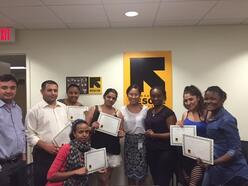Refugees face significant financial challenges when they first arrive in the United States. They often come without any savings, have little knowledge of the United States banking system, and are hurt by their lack of American credit history. They are particularly vulnerable to scams and predatory lending, and may not have the English abilities to advocate for themselves.
In response to meet this need of our clients, the Economic Empowerment Program (EEP) was formed at the IRC in Silver Spring, which offers comprehensive employment services that provide support to refugees looking for their first jobs here in the greater Washington region. The program also assists those who are currently working to obtain a career upgrade such as a skill certification. In the past year, the EEP program has added a key component to these services by integrating financial literacy training. The program has expanded to not only help our refugee clients find employment, but also giving them the resources they need to manage and maintain their finances.

The IRC in Silver Spring has worked to fill this knowledge gap by introducing financial literacy courses to all employable clients. The process started in November 2015 with staff surveys and research to determine the specific financial needs of refugees. An advanced curriculum was then developed for the IRC’s Career Development Program, which focuses on refugees who are looking for long-term, professional careers. The interactive course was tailored specifically to these individuals, and contains information on budgeting, saving and spending smartly, building credit, and avoiding financial scams.
Marie, a Career Development participant and asylee from Cameroon, spoke about the challenges of learning the new financial system when moving to the US. “Everything you can buy back home is in cash. We don’t have a credit card over there,” she says. She expressed that the financial education course was really helpful for her because it taught her how to properly manage her secured credit card.
Another client, Abdul, similarly spoke about how different the American financial system is from the one in his home country of Afghanistan. He observed that everything in the US was focused on online financial transactions and credit was extremely important. “After attending the trainings, it gave me a lot of confidence and a lot of tips and tricks about money management,” he notes.
In the past 8 months, over 200 IRC clients have attended a financial education course, and over 98% of these individuals have shown an increase in their financial literacy assessment scores after the class.
“The benefits of fully incorporating financial literacy into employment programs are immense, and we’re pleased to offer tiered financial literacy trainings that meet the needs of clients during their journey toward economic independence,” expressed Hannah Stocks, the Silver Spring IRC Employment Supervisor. The Economic Empowerment Program staff at the IRC in Silver Spring looks forward to expanding financial literacy courses to even more refugees in the upcoming year to truly help these individuals become economically self-sufficient.
Authored by: Olivia Williams